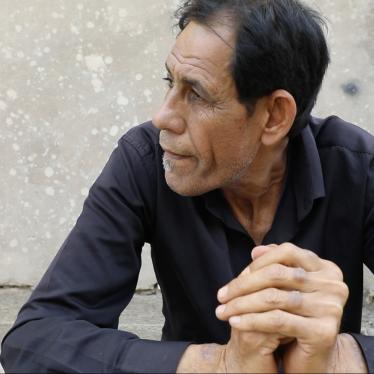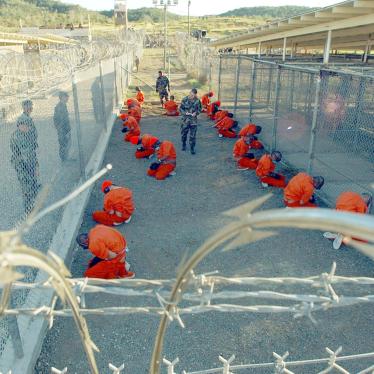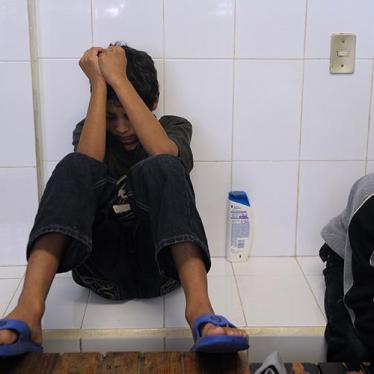The military commissions which begin next week lack key fair trial protections, Human Rights Watch said today. Legal experts from Human Rights Watch will observe the military commission proceedings at Guantanamo Bay, Cuba.
“We welcome the Pentagon’s decision to allow Human Rights Watch to observe the military commissions,” said Wendy Patten, U.S. advocacy director at Human Rights Watch. “Independent monitors will be able to assess the fairness of the proceedings.”
Preliminary hearings by the military commissions are slated to begin during the week of August 23. To date, the Bush administration has declared 15 detainees eligible for trial. In four cases, charges have been referred to the commissions. The four detainees are Ali Hamza Ahmed Sulayman al Bahlul and Salim Ahmed Hamdan of Yemen, David Hicks of Australia, and Ibrahim Ahmed Mahmoud al Qosi of Sudan.
“While Human Rights Watch will closely scrutinize the actual proceedings, we’re concerned that the military commission rules lack key fair trial protections,” said Patten. “Under these rules, the military serves as prosecutor, judge, jury, appeals court and potentially even as executioner. The commission rules do not create a level playing field.”
Authorized by presidential order on November 13, 2001, the military commissions are set up to prosecute non-U.S. citizens who have allegedly participated in international terrorist acts against the United States. The commissions are comprised of current or retired members of the U.S. armed forces.
However, the normal rules of procedure in a court martial—the proceeding under which members of the U.S. armed forces are tried—do not apply in the military commissions. In commission proceedings, hearsay evidence can be admissible, and the defendant is not guaranteed to see all the evidence in the case, denying him the basic right to confront the evidence used against him.
Perhaps most critically, there is no appeal to a civilian court, as is the case with courts martial. Final review rests with either the U.S. Secretary of Defense or the President, leaving the ultimate verdict and sentence entirely within the military chain of command.
“The military commissions offer no possibility for independent appeal, no matter how serious the error,” said Patten. “A fair system of justice provides an opportunity for trial mistakes to be corrected through independent review.”
The structure of the military commissions contains the following critical flaws, making it fall far short of international due process standards and the requirements of the Geneva Conventions. The commissions:
- Deprive defendants of independent judicial oversight by a civilian court.
- Improperly subject criminal suspects to military justice.
- Try individuals who may be prisoners of war (POWs) in a manner that violates the 1949 Geneva Conventions.
- Deprive defense counsel of the means to prepare an effective defense.
- Place review of important interlocutory questions with the charging authority.
- Fail to guarantee that evidence obtained via torture or ill-treatment will not be used.
- Allow wide latitude to close proceedings and impose a “gag order” on defense counsel.
- Deprive military defense counsel of normal protections afforded military lawyers from improper “command influence.”
- Restrict the defendant’s right to choose his lawyer.
- Provide lower due process standards for non-citizens than for U.S. citizens.
These concerns are discussed in detail in an updated and revised Human Rights Watch briefing paper on the military commissions.
Human Rights Watch has monitored numerous trials around the world, including those involving allegations of war crimes and crimes against humanity. As the military commissions proceed, a rotating group of experts from its staff will represent Human Rights Watch at the trials in Guantanamo Bay.








